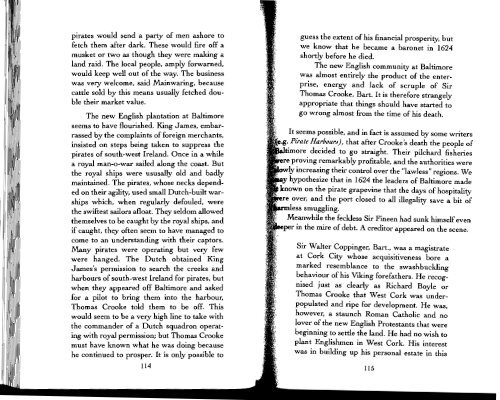Create successful ePaper yourself
Turn your PDF publications into a flip-book with our unique Google optimized e-Paper software.
pirates would send a party of men ashore to<br />
fetch them after dark. These would fire off a<br />
musket or two as though they were making a<br />
land raid. The local people, amply forwarned,<br />
would keep wen out of the way. The business<br />
was very welcome, said Mainwaring, because<br />
cattle sold by this means usually fetched double<br />
their market value.<br />
The new English plantation at Baltimore<br />
seems to have flourished. King James, embarrassed<br />
by the complaints offoreign merchants.<br />
insisted on steps being taken to suppress the<br />
pirates of south-west Ireland. Once in a while<br />
a royal man-o-war sailed along the coast. But<br />
the royal ships were ususally old and badly<br />
maintained. The pirates, whose necks depended<br />
on their agility, used small Dutch-built warships<br />
which, when regularly defouled. were<br />
the swiftest sailors afloat. They seldom allowed<br />
themselves to be caught by the royal ships, and<br />
ifcaught, they ohen seem to have managed to<br />
corne to an understanding with their captors.<br />
.Many pirates were operating but very few<br />
were hanged. The Dutch obtained King<br />
James's permission to search the creeks and<br />
harbours of south-west Ireland for pirates. but<br />
when they appeared off Baltimore and asked<br />
for a pilot to bring them into the harbour,<br />
Thomas Crooke told them to be off. This<br />
would seem to be a very high line to take with<br />
the commander of a Dutch squadron operating<br />
with royal permission; but Thomas Crooke<br />
must have known what he was doing because<br />
he continued to prosper. It is only possible to<br />
114<br />
guess the extent of his financial prosperity, but<br />
we know that he became a baronet in 1624<br />
shortly before he died.<br />
The new English community at Baltimore<br />
was almost entirely the product of the enterprise,<br />
energy and lack of scruple of Sir<br />
Thomas Crooke, Bart. It is therefore strangely<br />
appropriate that things should have started to<br />
go wrong almost from the time ofhis death.<br />
It seems possible, and in fact is assumed by some writers<br />
Pirate Harbour,,), that a&er Crooke's death the people of<br />
decided to go straight. Their pilchard fisheries<br />
proving remarkably profitable, and the authorities were<br />
increasing their control over the "lawless" regions. We<br />
hypothesize that in 1624 the leaders of Baltimore made<br />
known on the pirate grapevine that the days of hospitality<br />
over. and the port closed to all illegality save a bit of<br />
lU'rIIless smuggling.<br />
Meanwhile the feckless Sir Fmeen had sunk himself even<br />
in the mire ofdebt. A creditor appeared on the scene.<br />
Sir Walter Coppinger. Bart., was a magistrate<br />
at Cork City whose acquisitiveness bore a<br />
marked resemblance to the swashbuckling<br />
behaviour of his Viking forefathers. He recognised<br />
just as clearly as Richard Boyle or<br />
Thomas Crooke that West Cork was underpopulated<br />
and ripe for development. He was,<br />
however, a staunch Roman Catholic and no<br />
lover of the new English Protestants that were<br />
beginning to settle the land. He had no wish to<br />
plant Englishmen in West Cork. His interest<br />
was in building up his personal estate in this<br />
ll5


